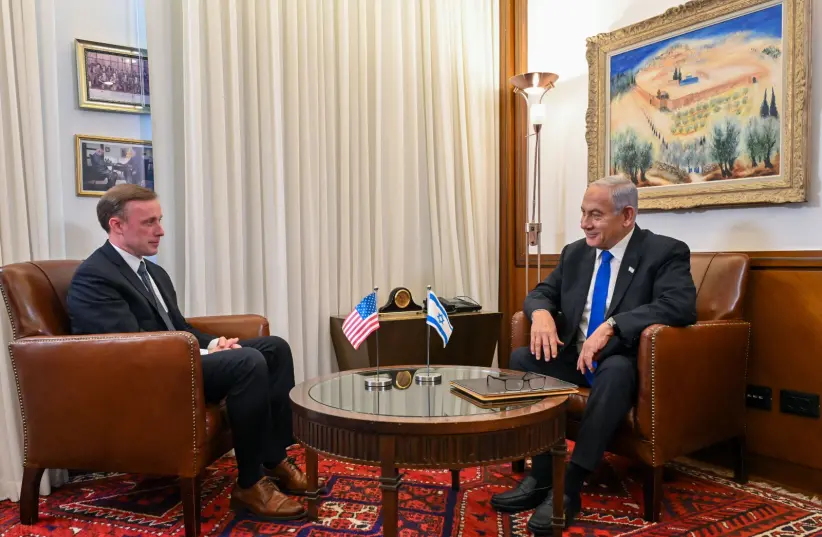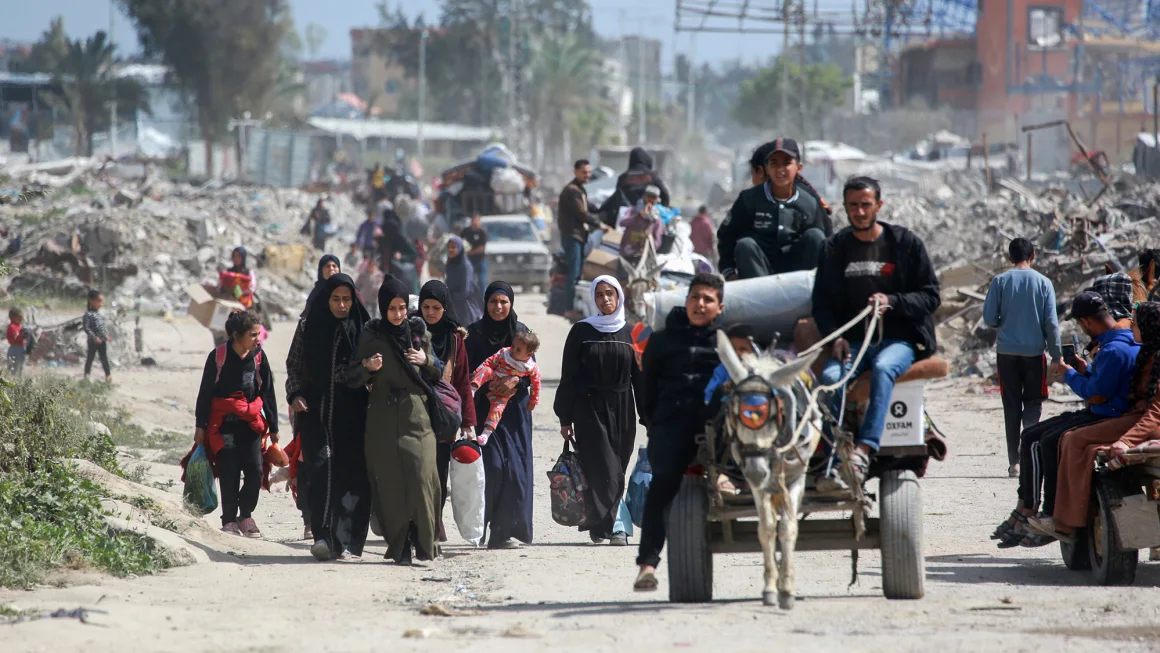Foreign
Israel, US discuss regional impact of Russia’s military alliance with Iran

US National Security Advisor Jake Sullivan landed in Israel on Wednesday to meet with PM Benjamin Netanyahu.

The regional impact of Russia’s growing military alliance with Iran was on the agenda when Prime Minister Benjamin Netanyahu spoke Thursday in Jerusalem with US National Security Advisor Jake Sullivan.
The two men also discussed a joint Israeli American strategy against Iran and a possible normalization deal between Saudi Arabia and the Jewish state.

“You should know that we see you as a trusted partner in matters of assuring security and of course advancing peace,” Netanyahu told Sullivan.
“Today you come at a special time because we have acute challenges to our security and vast opportunities for peace,” he added.
Sullivan is the first high-level member of the Biden administration to come to Israel since Netanyahu’s new government was sworn in last month. A visit by US Secretary of State Antony Blinken is expected to follow as well as a possible Netanyahu trip to Washington.
He comes at a time when US attention is increasingly focused on the Russian-Ukrainian war, sparking fear that does not plan to be as engaged in the Middle East.
The public conversation around the visit focused mostly on areas of cooperation between the two countries. The two men discussed the joint effort between their countries to halt Iran’s nuclear program and Tehran’s destabilizing activities in the region, according to the Prime Minister’s Office.
Sullivan underscored for Netanyahu that US President Joe Biden is
Iran had in the past been a divisive issue between Jerusalem and Washington, due to the Jewish state’s opposition to the 2015 Iran deal. Now that the deal appears to be off the table, the two governments are expected to for a stronger united front when it comes to a joint strategy to combat Iran.
The growing military alliance between Iran and Russia as well as Tehran’s execution of protestors has also helped tightened the US-Israeli alliance against the Islamic Republic.
The White House pledges it “unwavering commitment to Israel’s security and to countering the continued threats posed by Iran to Israel, the United States, and the wider region,” in a statement it issued Thursday night about the visit.
In his talks with Israel, “Sullivan stressed the US commitment to ensure Iran can never acquire a nuclear weapon.
“They also discussed Ukraine, as well as the burgeoning defense partnership between Russia and Iran and its implications for security in the Middle East region,” the White House said.
US State Department spokesman Vedant Patel said that “Iran’s destabilizing actions” such as its provision to Moscow of armed drones and other security assistance to Russia for use in Ukraine, it is troubling for the world and “has immediate impacts on Israel and Israel’s neighbors as well as other countries in the region.”
When it came to the region the two men also spoke about expanding the Abraham Accords under whose auspices Israel normalized ties with four Arab countries.
Israeli officials have recently issued a number of statements about a possible pending deal with Saudi Arabia.
There was an “emphasis on a breakthrough regarding Saudi Arabia” with respect to the normalization of ties between the two countries, the PMO said.
The issues of Iran and Saudi Arabia were raised in many of Sullivan’s meetings with Israelis throughout the day, including with Foreign Minister Eli Cohen, and Defense Minister Yoav Gallant.
“Cooperation between Israel and the US is necessary to remove the Iranian threat over Israel, the Middle East and the entire world,” Cohen told Sullivan.
“I emphasized the need for increasing US pressure on Iran, which would allow for further regional breakthroughs, including the expansion of cooperation based on the “Abraham Accords,” Cohen said.
At the World Economic Forum in Davos, Wednesday Saudi Arabia’s Foreign Minister Prince Faisal bin Farhan Al Saud said the focus needed to be on achieving a two-state solution to the Israeli-Palestinian conflict.
In Jerusalem, on Thursday however, Israeli and US officials focused on strengthening Israel’s regional ties, without any advancement on the Palestinian track.
Sullivan and his counterparts from Israel, Bahrain and the United Arab Emirates — Tzachi Hanegbi, Nasser bin Hamad Al Khalifa and Sheikh Tahnoun bin Zayed Al Nahyan — held a Zoom meeting on how to advance regional issues in the areas of clean energy, emerging technology, regional security, and commercial relations.
They also discussed the Negev Forum, which also includes Morocco and Egypt as well as the I2U2, which is the Israel, India, US and UAE partnership.
The White House said that, “Sullivan underscored President Biden’s commitment to promoting a more integrated, prosperous, and secure Middle East region with benefits for all of its people.”
Separately Cohen held his first conversation with his Egyptian counterpart Sameh Shoukry, which signed a peace deal with Israel in 1979. It was the first country to do so, but cooperation has not been maximized and there is a push to expand relations.
Cohen praised the conversation between them as “excellent” and said, “we agreed to strengthen our bilateral relations to maintain regional stability.
“Following my visit to Egypt about two years ago, which led to the opening of flights to Sharm el-Sheikh and an increase in the volume of economic trade, we agreed to promote further steps to increase the number of flights and expand economic ties,” Cohen tweeted.
The meeting is held amid Israeli-Palestinian tensions
Sullivan arrived amid tensions between the Biden administration and Israel over its the new government’s judicial overhaul, potential issues in its treatment of minorities and women, as well as its stance in support of settlement growth and against a Palestinian state.
The White House hinted at the discord hen it said that “in all of his meetings, Mr. Sullivan recalled that the United States’ longstanding partnership with Israel, which celebrates its 75th anniversary this year, is built on mutual interests and democratic values.
“Sullivan stressed that the Administration will continue to support the two-state solution, and will discourage policies that endanger its viability,” the White House said.
It added that “Sullivan underscored the urgency of avoiding unilateral steps by any party that could inflame tensions on the ground, with special attention to maintaining the historic status quo with respect to the holy places in Jerusalem.”
“I have known President Biden for 40 years as a great friend of Israel and I know how much he trusts you in matters of national security.
“You should know that we see you as a trusted partner in matters of assuring security and of course advancing peace. Today you come at a special time because we have acute challenges to our security and vast opportunities for peace.
Israel took time to explain to Sullivan its decision to level financial sanctions on the Palestinian Authority and to halt Palestinian construction in Area C of the West Bank, which is under IDF military and civilian control.
The move came in response to the PA’s successful campaign that culminated last month in UN General Assembly to request from the International Court of justice for an advisory opinion on the illegality of the “occupation.”
Netanyahu told Sullivan that the Palestinian push for an ICJ opinion was a direct attack against the Jewish state that justified its response.
Participants in an expanded meeting included Strategic Affairs Minister Ron Dermer, Netanyahu’s Chief of Staff Tzachi Braverman, National Security Adviser Tzachi Hanegbi, Israeli Ambassador to the US Mike Herzog, Deputy Assistant to Biden Brett McGurk and US Ambassador to Israel Thomas Nides.

Foreign
Hamas claims spokesperson killed in Israeli strike on northern Gaza

Earlier this week, Israel killed Ismail Barhoum, a member of Hamas’ political office, and Salah al-Bardaweel, another senior leader.

Hamas spokesman Abdel Latif al-Qanou was allegedly killed in an Israeli airstrike on northern Gaza, Hamas-affiliated news agency Shehab reported on Wednesday night.

Al-Qanoa was one of Hamas’s most prominent spokesmen in Gaza, and while he avoided media appearances during the months of fighting, he gave multiple interviews to Arab news channels after the ceasefire.
Al-Qanoua was killed when his tent was targeted in Jabaliya, the Hamas-run Al-Aqsa television reported. The same strike wounded several people, medical sources said.
Earlier this week, Israel killed Ismail Barhoum, a member of Hamas’ political office, and Salah al-Bardaweel, another senior leader.
Both Bardaweel and Barhoum were members of the 20-member Hamas decision-making body, the political office, 11 of whom have been killed since the start of the war in late 2023, according to Hamas sources.
Tents for Palestinians seeking refuge are set up on the grounds of a United Nations Relief and Works Agency for Palestine Refugees (UNRWA) centre in Khan Yunis in the southern Gaza Strip on October 19, 2023, amid the ongoing battles between Israel and the Palestinian group Hamas (credit: MAHMUD HAMS/AFP via Getty Images)
The IDF has yet to comment on the alleged elimination.
Increased IDF pressure in the Gaza Strip
Since fighting in Gaza was renewed at the beginning of last week, the IDF has killed 150 terrorists, including 10 top Hamas officials, The Jerusalem Post learned Tuesday.
In certain areas, the military has entered a full kilometer into Gaza, such as around the Nitzanim Corridor in central Gaza.
In addition to central Gaza, Beit Lahia, Beit Hanoun, parts of Khan Yunis, Shaboura, and Tel Sultan, the IDF has been evacuating and moving into Jabaliya.

Foreign
Dead Nigerians, Africans, others without will may lose unclaimed estates in UK

Hundreds of unclaimed estates reveal untold stories of African migration, wealth, and family ties left behind.
Thousands of people die every year in the United Kingdom without leaving a will or identifying next of kin, and among them are many Nigerians and other Africans whose estates—ranging from property to savings—remain unclaimed.
The UK government’s latest list of unclaimed estates, updated daily, includes over 170 entries connected to African-born individuals, with Nigerians making up a significant portion of the cases.

A Legacy Lost
For many migrants, the UK became a home away from home—a land of opportunity where they built wealth, purchased property, and created a life.

However, the absence of a will often results in their assets being classified as “bona vacantia” (ownerless goods), leaving them to the custody of the Crown.
Families back in Africa are frequently unaware of these estates, leading to a permanent loss of assets.
Cases like that of Adenike Adebiyi, who passed away in Hackney, London, in 2004, or Solomon Adekanmibi, who died in Colchester, Essex, in 2021, highlight the consequences of dying intestate.
With no identified next of kin or missing documentation, their estates remain unclaimed, and their legacies risk being forgotten.
Why It Matters
This phenomenon underscores a critical issue: many African families are unaware of their relatives’ financial situations abroad.
Migration often disrupts communication, and without clear documentation, the wealth built overseas remains beyond reach.
The loss isn’t just financial—it’s deeply cultural and emotional. Unclaimed estates represent untold family histories, connections, and the struggles of migrants who built their lives in the diaspora.
The Challenges
Lack of Awareness:
Most families in Nigeria and other African countries are unaware of their relatives’ estates abroad or how to access them.
Genealogical Gaps:
The information provided in official records is often incomplete. For example, many entries in the UK unclaimed estates list lack detailed family history or next-of-kin information.
Cultural Hesitations:
In many African cultures, discussing death and wills is considered taboo, leading to reluctance in planning for asset distribution.
A Call to Action
African governments, community organizations, and legal professionals need to raise awareness about this issue.
Here’s what can be done:
Encouraging Will Writing: Migrants in the diaspora should be educated about the importance of drafting wills to protect their assets.
Genealogical Support: Families in Africa can be assisted in tracing unclaimed estates through local or international partnerships.
Public Awareness Campaigns: Social and traditional media can highlight the importance of estate planning and share resources for families.
How to Check the List
The UK government maintains a public Unclaimed Estates List that is updated daily.
Families can search the list by name, place of birth, or other identifiers to check for potential claims.
Final Thoughts
For many Nigerians and Africans in the UK, their unclaimed estates represent more than just wealth—it’s a story of migration, resilience, and identity.
By addressing this growing issue, families can reclaim their heritage, and the legacy of those who journeyed to the diaspora need not be forgotten.
Here is the latest daily update as of March 24, 2025. Check the list

Foreign
Israel approves controversial proposal to facilitate emigration of Palestinians from Gaza

Israel’s security cabinet has approved a controversial proposal to facilitate Palestinian emigration from Gaza, a move critics warn could amount to ethnic cleansing.

Israeli Finance Minister Bezalel Smotrich on Sunday said the security cabinet approved the proposal by Defense Minister Israel Katz to organize “a voluntary transfer for Gaza residents who express interest in moving to third countries, in accordance with Israeli and international law, and following the vision of US President Donald Trump.”

The decision marks a remarkable endorsement of a plan once considered a far-right fantasy – and comes despite the prime minister’s earlier pledge not to permanently displace Gaza’s civilian population.
Critics have said that any mass displacement of Gazans in the midst of a devastating war would amount to ethnic cleansing, an act associated with war crimes and crimes against humanity under international law. Israeli officials have countered that emigration would be voluntary and in line with international legal standards.
But aid groups argue that Israel’s war has made life in Gaza nearly impossible. Martin Griffiths, the United Nations’ top emergency relief official, has called the enclave “uninhabitable,” saying its people are “witnessing daily threats to their very existence.”
The Israeli approval would establish an administration within the defense ministry “to prepare and facilitate the safe and controlled movement of Gaza residents who wish to voluntarily move to third countries,” according to a statement from the defense ministry.
Its work would include “establishing movement routes, pedestrian checks at designated crossings in the Gaza Strip,” and infrastructure to enable people to leave.
Israeli officials have presented the plan as a fulfillment of a desire by Trump to take over Gaza, expel its Palestinian population to neighboring countries and turn it into a Middle Eastern “riviera.”
The Palestinian Authority’s Minister of State for Foreign Affairs Varsen Aghabekian Shaheen told CNN’s Becky Anderson last month that Palestinians “are steadfast to stay in their land and will not move.”
Trump’s ‘vision’
Katz said Sunday that Israel is using “all means to implement the vision of the US president,” according to the defense ministry statement.
This month, Trump appeared to backtrack on his comments about displacing Palestinians, telling reporters that “nobody is expelling any Palestinians.” Steve Witkoff, the US special envoy to the Middle East, said last month that the US initiative to rebuild Gaza won’t necessarily amount to an “eviction plan” and that it was designed to “shake up everybody’s thinking.”
Last year, Israeli Prime Minister Benjamin Netanyahu said his country had no intention to displace Palestinians or occupy Gaza.
Related articleTrump says ‘nobody is expelling Palestinians,’ weeks after saying they should be moved to Arab states
“I want to make a few points absolutely clear: Israel has no intention of permanently occupying Gaza or displacing its civilian population,” Netanyahu said in a video statement in January 2024.
Trump’s proposal has, however, brought the idea further into the mainstream, with Israeli politicians now openly discussing mass emigration of Gazans as a solution to the war. And Katz last week said that Israel may maintain a permanent presence in the enclave.
Israeli rights group Peace Now criticized the plan, saying “the establishment of the administration to expel Palestinians from Gaza is one of the stupidest moves by a government that has lost all direction and logical thinking.”
The prospect has also drawn sharp rebuke from Arab leaders, especially Egypt and Jordan, who would be expected to absorb the large number of expelled Palestinians. Experts have also warned that displacing Palestinians would further destabilize the region and threaten the security of neighboring states.
Smotrich said Sunday that the security cabinet also approved the expansion of Jewish settlements in the occupied West Bank, noting that 13 areas in the West Bank would be split from existing settlements and would be recognized as independent settlements.
“Instead of hiding and apologizing – we are raising the flag, building, and settling. This is another important step on the path to actual sovereignty in Judea and Samaria,” he said, using the name by which Israelis refer to the West Bank.
The Yesha Council, an umbrella body representing Jewish settlements, said that as of January 2024, there were 150 settlements in the West Bank.
It said that the decision exposes a “long-standing lie that (Israel) does not establish new settlements, but only ‘neighborhoods’ of existing settlements” and that it is “another nail in the coffin that the Government of Israel is preparing for the only chance for a future of peace and security.”
A statement sent by Smotrich’s office said the move comes against “the backdrop of the approval of tens of thousands of housing units in Judea and Samaria and represents another significant step in the process of normalizing and regulating the settlement.”
Smotrich and other right-wing ministers have been pushing an aggressive expansion of settlements on the path to declaring Israeli sovereignty over the West Bank, which would be in defiance of international law and UN Security Council resolutions.
Israel says it will maintain ‘permanent’ presence in Gaza unless hostages are freed

-

 Foreign1 week ago
Foreign1 week agoHouthis declare Ben-Gurion Airport ‘no longer safe’ after renewed Gaza fighting
-

 News1 week ago
News1 week agoWhy Christ Embassy’s Pastor Chris holds Abuja mega crusade – Fisho
-

 News2 days ago
News2 days agoKogi Governor, Ahmed Usman Ododo salutes Tinubu at 74
-

 News1 week ago
News1 week agoUmeh denies receiving $10,000 with other 42 Senators to support state of emergency in Rivers
-

 Crime1 week ago
Crime1 week agoGhana’s anti-drug agency nabs Nigerian drug kingpin, Uchechukwu Chima, seizes $2.1m worth of cocaine, heroin
-

 News2 days ago
News2 days agoPlateau LP stakeholders endorses Barr Gyang Zi’s defection to APC
-
News10 hours ago
Abia: LG Chairman, Iheke accused of using soldiers to detain IRS agent, claims Governor Otti’s support
-

 News2 days ago
News2 days agoAkpabio pays historic visit to office of SA to President on Senate Matters



















